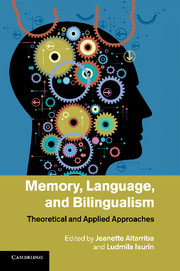Book contents
- Memory, Language, and Bilingualism
- Memory, Language, and Bilingualism
- Copyright page
- Contents
- Figures
- Tables
- Contributors
- Introduction
- 1 Bilingual memory:
- 2 Lexical competition in localist and distributed connectionist models of L2 acquisition
- 3 Working memory and (second) language processing
- 4 Working memory in simultaneous interpreters
- 5 Using electrophysiological measures to track the mapping of words to concepts in the bilingual brain:
- 6 Age effects in L2 learning:
- 7 Bilingualism, language, and aging
- 8 Crossovers and codeswitching in the investigation of immigrant autobiographical memory
- 9 Linguistic relativity and bilingualism
- 10 Testing effects for novel word learning in Chinese–English bilinguals
- 11 The lexicon in second language attrition:
- 12 Memory and first language forgetting
- 13 Future research directions:
- Index
10 - Testing effects for novel word learning in Chinese–English bilinguals
Published online by Cambridge University Press: 05 November 2012
- Memory, Language, and Bilingualism
- Memory, Language, and Bilingualism
- Copyright page
- Contents
- Figures
- Tables
- Contributors
- Introduction
- 1 Bilingual memory:
- 2 Lexical competition in localist and distributed connectionist models of L2 acquisition
- 3 Working memory and (second) language processing
- 4 Working memory in simultaneous interpreters
- 5 Using electrophysiological measures to track the mapping of words to concepts in the bilingual brain:
- 6 Age effects in L2 learning:
- 7 Bilingualism, language, and aging
- 8 Crossovers and codeswitching in the investigation of immigrant autobiographical memory
- 9 Linguistic relativity and bilingualism
- 10 Testing effects for novel word learning in Chinese–English bilinguals
- 11 The lexicon in second language attrition:
- 12 Memory and first language forgetting
- 13 Future research directions:
- Index
Summary
The current study explored the influence of individuals’ language proficiency on the observed benefit of repeated testing when they learned Swahili–English word pairs. Sixty Chinese–English bilinguals learned 40 Swahili–English word pairs for a subsequent Swahili cued-recall test given one week later. In the acquisition phase, participants acquired 20 pairs via repeated study and the other 20 via repeated testing, where they were instructed to give the English translation equivalent in response to its corresponding Swahili word. After about a week, participants were given a Swahili cued-recall test for all 40 pairs. Their first language (Chinese) and second language (English) proficiency were estimated by their grades on the Hong Kong Certificate of Education Examination and the Hong Kong Advanced Level Examination. The Shipley vocabulary subscale (1940) was also used to estimate participants’ English proficiency. The results showed an overall testing effect; that is, English words were better recalled when the pairs were acquired via repeated testing than when they were acquired by repeated study. The effect was larger for those with higher English proficiency, which can be interpreted in the context of Kroll and Stewart’s (1994) Revised Hierarchical Model of bilingual memory. The limitations of the current study and future directions are discussed.
- Type
- Chapter
- Information
- Memory, Language, and BilingualismTheoretical and Applied Approaches, pp. 256 - 290Publisher: Cambridge University PressPrint publication year: 2012
- 2
- Cited by



